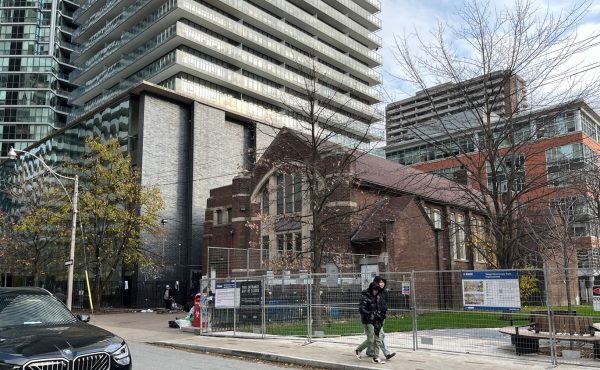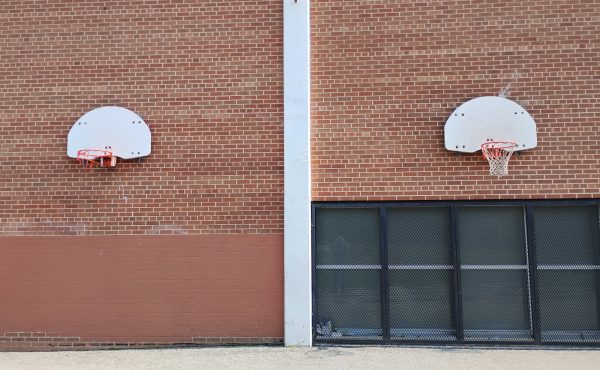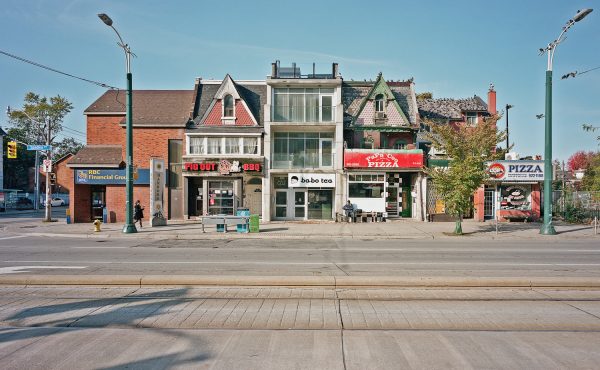
EDITOR’S NOTE: Around 10am this morning, one of Toronto’s great civic leaders passed away after a two year battle with cancer. David Pecaut was the Chair and founder of the Toronto Summit Alliance, and was a major force behind Greening Greater Toronto, DiverseCity, Emerging Leaders Network, as well as leading The Boston Consulting Group. Last week, David sent out a mass email to his friends and colleagues outlining how he views the future of Toronto. Spacing received permission to re-print his letter. You can also read the Globe and Mail obituary and Spacing editor Shawn Micallef’s piece in Eye Weekly.
![]()
Friends and Colleagues,
As many of you know, I have been battling cancer over the past while and have been focusing in recent weeks on spending time with my family. I am truly lucky to be blessed with an incredible wife and children.
As a consequence of my health issues, I have not had the chance to see many of you and express my appreciation for all the work we have done together. Nor have I had the chance to share some of my thoughts on Toronto’s future. This note gives me the opportunity to do both.
Working with you on all manner of city building activities has been one of the greatest highlights of my life.
Aside from my family, there is nothing for me more personally gratifying than working with other citizens in our community to address a civic challenge or identify an opportunity we can make happen together. I feel very lucky to have found in Toronto a place where so many others felt the same way.
When I moved to Toronto nearly 30 years ago, I am embarrassed to say that I did not really know very much about the city. It did not take long for me to become charmed by the wonderful diversity of the city’s neighbourhoods and people, the green spaces in our unique ravines and along the lake, and dozens of other surprises, both large and small.
But the most amazing thing that struck me at every turn was how many people from all walks of life in this city were passionately concerned with making it a great city. There was a wide belief that Toronto had something special to offer the world. There was deep pride in big things the city had done – like building a great transit system – and equal passion for how to get the small things right, like making our neighbourhoods truly successful.
I also discovered that Toronto is a uniquely open city in the sense that people here cross boundaries more easily than in other places – no doubt partly due to the fact we have so many immigrants from so many different cultures. That openness made it easy to connect with others on civic projects. For me, the largest of these has been working with so many of you on the Toronto City Summit Alliance (TCSA).
November, 2009 marked the seventh anniversary of the launch of the TCSA.
At last count there have been over 6,000 volunteers involved in Alliance activities. Some of these are working on large current projects such as DiverseCity (partnered with the Maytree Foundation), or Greening Greater Toronto – both of which came out of our 2007 Summit. Others have contributed to smaller and more informal activities. The work of the Alliance these past seven years has rested firmly on the many contributions of these volunteers drawn from all sectors of civil society.
Our Alliance CEO Julia Deans and our terrific staff have done a great job supporting all these activities, and on behalf of all involved in the TCSA I want to thank them for their hard work and incredible enthusiasm. I also want to thank all the organizations and individuals who have contributed financial and pro bono support. These contributions have made it possible to leverage the work of our volunteers dramatically.
As I look back at seven years of work at the TCSA, I think our founding principles in creating the Alliance have held up very well:
* Taking a regional perspective that recognizes many issues cross municipal boundaries.
* Tackling both the economic and social issues facing the region together. Toronto cannot be economically successful without having a strong social infrastructure that addresses education, poverty, the integration of immigrants, the strength of our neighbourhoods and other fundamental social needs.
* Convening all sectors of civil society around the same table with leaders from the business community, the non-profit sectors, labour and government.
* Being strictly non-partisan in all we do.
* Staying open and welcoming to anyone who was interested in getting involved.
* Committing to action or, as someone on our steering committee said, “no reports just sitting on the shelf.”
As the Alliance has worked with partners across the region, it has been gratifying this past year to see continued developments on some of the remaining areas that we focused on in our original action plan, “Enough Talk”. Metrolinx, for example, is now up and running and starting to tackle the regional transportation issues facing us.
It is also very gratifying to see the Ontario Child Benefit, the Federal Working Income Tax Benefit, and other ideas that so many of you contributed to during the Modernizing Income Security for Working Age Adults Task Force project now being funded by the Province and the federal government and making such a significant difference in the lives of low income families in our region and across the rest of Ontario and the country. It is a good example of the power of all sectors working together to address a very complex set of issues and finding a consensus that could move things forward. There is still much in the MISWAA report and the work of others that needs to be done, but these initial steps by governments have already made a great difference.
It has also been exciting this year to see groups like the Emerging Leaders Network spawning a whole new generation of creative and social initiatives, and in the process stimulating connections across communities and sectors that have not been connected before.
Like so many aspects of city building, as people work on projects outside their normal spheres of activity, they get connected to new people and sectors in the city, and the power and value of everything gets multiplied many times over.
There will be a lot of discussion next year about Toronto’s future. The election of new political leaders – mayors and councillors – will be important for all our municipal governments. But of equally profound importance is a broader question: “What really is our collective vision for Toronto – this city region five million of us call home?” Often when that question is posed, the response is likely to be a long list of attributes describing what Toronto should or could be. And sometimes, such discussions descend into negative territory: what doesn’t work in Toronto, why so many issues seem stuck in gridlock; or worst of all, why we so often seem to lack the resources to enable important new ideas to happen.
Perhaps we are responding to the question the wrong way. I believe that good ideas and civic projects with a strong consensus and collective support will attract resources. We have seen this happen with the campaign to build or renovate seven major new cultural buildings across the city. Regarded by many as “too much at once” and “impossible to fund”, these ambitious projects are succeeding because of the great work done up-front to build the consensus, plan and commission the facilities, and coordinate the fundraising.
As I look at the future of Toronto, I am as excited as I have ever been about what the 5 million people here have to offer the world. To me the potential of Toronto lies not so much within its architectural or economic or social possibilities as in what it could represent to the world as a place where amazing things get done because this city is full of conveners, of civic entrepreneurs, of people who understand in their collective DNA how to bring all the parts of civil society around a table to solve problems, seize opportunities, and make great things happen.
It is this capacity of social mobilization that can be Toronto’s greatest gift to the world. We should stop worrying about global rankings and focus on what will make us truly special – which is that we can be the best in the world at collective leadership.
We can be a city where collective leadership is the norm. A city where civic entrepreneurs are everywhere and the process of bringing all the parts of civil society together to solve a problem is really how the city defines its uniqueness – a city where this quality is the essence of what makes Toronto so special.
In that sense, Toronto’s gift to the world could be this unique and powerful model of city building that comes from collective leadership.
A city that is filled with civic entrepreneurs practicing collective leadership will be able to face any challenge and do all kinds of great things on economic issues, social issues, education, the arts, the environment, leveraging the richness of our diversity, and much much more.
When I look back at all the civic projects that we have had the chance to work on, I am filled with huge appreciation for all that we have done together. When the Toronto City Summit Alliance launched in 2002, it could start quickly, because it stood on an incredible foundation of work across many years and many sectors by passionate city-builders who came before. Toronto is lucky to have so many people who care so much about making this a truly great city.
I want to take this opportunity to thank you for all that we have shared and done together and your support on so many civic initiatives. Now is a good time for us to pause, reflect upon, and celebrate that collective city building.
Thank you for all your enthusiasm, your trust and, most importantly, your passion for working together to realize the full potential of our great city.




2 comments
Thank you for publishing this in its entirety. In particular, “It is this capacity of social mobilization that can be Toronto’s greatest gift to the world.”
I feel myself profoundly saddened by David Pecaut’s passing, a man I never had the opportunity to meet but who has been described as “the best mayor Toronto never had”. His impact and his legacy is clearly very much alive. My thoughts today go to all of those who are feeling his profound absence today and in the days to come.
Now the work begins.
I worked at BCG with David Pecaut for many years. His passion for BCG and Toronto was infectous. He was a great man who motivated thousands of people to do incredible things together.
His passing is a loss for all of us – BCGers and the citizens of Toronto. He will be missed but not forgotten. We all should follow his example – improving the lives of the millions of people who are around us.